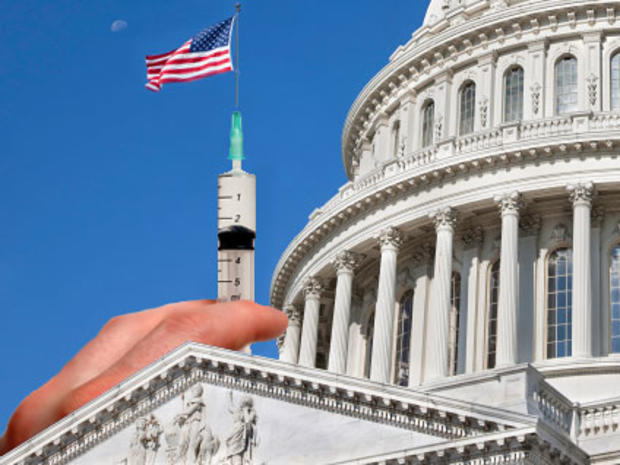Democrats, Republicans Spar over Health Reform Ruling
In the wake of a federal judge's decision that a key tenet of President Obama's health care reforms is unconstitutional, some Democrats are speaking out in defense of the law, with some critics charging that the ruling is all about politics.
Republicans and opponents of the law, meanwhile, say the decision vindicates their arguments that the health care overhaul overstepped constitutional boundaries and represents government overreach.
If anything is clear from the ruling, it's that the debate over President Obama's health care reforms are far from over.
U.S. District Judge Henry E. Hudson ruled that the bill's requirement for every American to acquire health insurance, which is known as the individual mandate, "exceeds the constitutional boundaries of congressional power." The Obama administration has argued the individual mandate is constitutional under interstate commerce rules, but the judge rejected that argument.
White House official Stephanie Cutter reiterated the White House's arguments on the White House blog today and sought to downplay the ruling.
"History and the facts are on our side," she wrote. "Similar legal challenges to major new laws -- including the Social Security Act, the Civil Rights Act, and the Voting Rights Act -- were all filed and all failed. Contrary to what opponents argue the new law falls well within Congress's power to regulate economic activity under the Commerce Clause, the Necessary and Proper Clause, and the General Welfare Clause."
Cutter also pointed out that Hudson's ruling does not interrupt the implementation of the rest of the health care law. The individual mandate is not slated to kick in until 2014.
As White House Press Secretary Robert Gibbs reminded reporters at a briefing today, however, the individual mandate is a central component of the overall reforms that could impact other provisions, such as the rule prohibiting insurance companies from discriminating against consumers with pre-existing conditions.
The individual mandate is "the basis and the foundation for examining and doing away with insurance company discrimination on behalf of pre-existing conditions," he said. "Without an individual responsibility portion in the law, you could not find yourself dealing with pre-existing conditions because the only people that would likely get involved in purchasing health care would be the very sick."
Incoming House Republican Leader Eric Cantor (Va.) released a statement suggesting the case be fast-tracked the Supreme Court. "In this challenging environment, we must not burden our states, employers, and families with the costs and uncertainty created by this unconstitutional law, and we must take all steps to resolve this issue immediately," he said.
Cantor called the ruling a "clear affirmation" that the law is unconstitutional and promised that the next House "will pass a clean repeal of ObamaCare."
Incoming House Speaker John Boehner (Ohio) implied in a statement that the ruling could influence the way states begin to implement portions of the health care overhaul.
"This is unwise, unaffordable, and as we have argued all along, unconstitutional," Boehner said. "If Washington thinks it can get away with this kind of power grab, it will think it can do anything. Cash-strapped states should carefully weigh the benefits of investing time and resources in ObamaCare's implementation now that its central mandate has been ruled unconstitutional."
Rep. Michele Bachmann (R-Minn.), head of the House Tea Party Caucus, got to the heart of Republican opposition of the individual mandate: "The United States was founded on freedom, and requiring citizens to purchase something against their will violates that fundamental value," she said.
House Speaker Nancy Pelosi (Calif.) said she is "confident that the Affordable Care Act will ultimately be sustained and will keep benefitting our middle class, our families, and our businesses, indeed every American."
Democratic Sen. Tom Harkin (Iowa), chairman of the Senate Health, Education, Labor and Pensions (HELP) Committee, called today's ruling "clearly wrong."
"When people seek medical care without health insurance and don't pay for it, they aren't opting out of the health care market," he said. "Instead, it adds more than $1,000 per year to the premiums of American families who act responsibly by having coverage. This clearly affects interstate commerce and is thus within Congress' power to regulate."
Democratic Sen. Patrick Leahy suggested the court challenge, put forward by Virginia's Republican Attorney General Kenneth Cuccinelli, was political in nature.
"Some of the same politicians bringing these suits once criticized court challenges of other laws, arguing that those plaintiffs were trying to achieve a victory in court when they did not have the votes to win in Congress," Leahy said in a statement. "The politically-motivated court challenges of the Affordable Care Act appear to be just that. Partisans who did not have the votes in the elected branches when the law passed after years of debate are now trying to fulfill their ideological priorities in court."
Some political commentators are also suggesting Judge Hudson was ruling out of bias, pointing to the fact that he has reported receiving income from stock in a Republican online communications firm, Campaign Solutions, Inc., of which Cuccinelli is a client.
Meanwhile, the Justice Department emphasized the point that two other federal courts have previously upheld the law as constitutional, as well as the fact that a dozen courts have dismissed cases against health care reform on jurisdiction or standing issues.
"We are disappointed in today's ruling but continue to believe - as other federal courts in Virginia and Michigan have found - that the Affordable Care Act is constitutional," Spokesperson Tracy Schmaler said. "There is clear and well-established legal precedent that Congress acted within its constitutional authority in passing this law and we are confident that we will ultimately prevail."
Whatever the final outcome, the Washington Post's Ezra Klein contends, Monday's ruling will have limited impact.
"Right now, the range of opinions stretch from 'the law is fine' to 'the individual mandate is not fine, but the rest of the law is,'" he wrote. "That could create problems for the legislation if the mandate is repealed and Republicans block any attempts at a fix, but it's a far cry from a world in which the Supreme Court strikes down the whole of the health-care law."
The policy implications may be limited, but the National Republican Senatorial Committee pointed out that the political ramifications could be significant. The NRSC released a statement targeting politically vulnerable Democratic Sen. Claire McCaskill (Mo.), who is up for re-election in 2012. The statement highlighted a proposition passed by Missouri voters in opposition to health care reform.
"Today's federal court decision serves as yet another reminder that Senator McCaskill has consistently ignored the views and values of Missouri families, while serving as a loyal rubberstamp for President Obama's out-of-touch agenda," NRSC spokeswoman Amber Marchand said.


